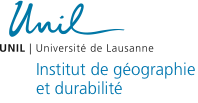Institute of Geography and Sustainability of the University of Lausanne
Research projects
Ticino's evolving identity in the process of globalisation: a geo-philosophical approach
| Research fields |
Urban matters |
| Keywords |
Urbanization Canton Ticino Spatial justice Identities Land-use planning Globalisation |
| Funding | FNS Doc.Ch |
| Duration | March 2017 - February 2020 |
| Website | |
| Researchers |
Stock Mathis (---) [web] [email] Cometta Mosè (---) |
How do regional realities evolve in a globalized world? The dynamics of urbanization no longer only affect major metropolitan centers, but also expand to semi-marginal areas. Nowadays, the former European countryside is hit by urban phenomena and global dynamics. This is the new frontier of capitalist development: the urbanization of the countryside (Harvey, 2016; Lefebvre, 2001). It is therefore necessary to study the phenomena and flows related to this change to better understand the present society. Ticino presents himself as a relevant case study to study the urbanization of semi-marginal areas in this globalized times, and it does so because of two distinctive features: Its «border region» configuration – as a place of passage and economical, cultural and political exchange – and his recent socio-economical evolution – from poor, agricultural and poor land to suburban area where the problems and imaginaries of little and medium cities dominate the agenda. Our work combines the analytical approach of political philosophy and of geography, with the goal of articulating a new interdisciplinary perspective that can lead to a better understanding of the complex issue of regional identity in a globalized world. Some steps in this direction have already been made by leading members of both disciplines – in what has been called the «spatial turn». Our work – understand the Ticino identity – is embedded in this «spatial turn», because we understand that identity is a political issue that cannot be defined without spatial references. Our proposal aims at a better comprehension of regional identity issue in globalized times it will be necessary prior to work on the definitions of three key concepts: identity, politics and territory. These key concepts are simply too complex and nuanced notions in order to be fully understood in the context of a single disciplinary approach. It is therefore necessary to develop a discourse that is as complete and comprehensive as possible, able to deal with empirical and theoretical analyses satisfactorily: the understanding of identity entails necessarily symbolic and imaginary aspects, cultural, social, and material practices, spatial configurations and planning policies. The contribution of our work is threefold. First, its interdisciplinary methodological approach is part of a long needed recent evolution in the literature. Secondly, it focuses on three key concepts of our civilization – identity politics, territory – which all share a very vague semantics and need to be explored to be better understood. Finally, Ticino represents a rich and pristine case study, which has never been analyzed in a systematic way. Our goal is that this study will help to enrich the discussion in Ticino and similar regions by providing more defined concepts and clearer ideas.

